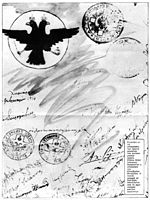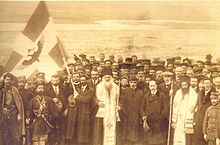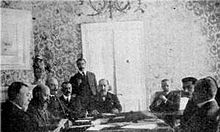- Northern Epirote Declaration of Independence
-
Northern Epirote Declaration of Independence 
Part of the declaration of Independence documentParticipants Provisional Government of Northern Epirus Location Argyrokastron,
Autonomous Republic of Northern Epirus (Albania)
Date February 28-May 2 1914 Result Uprising of "Northern Epirus" against incorporation to Albania,
Protocol of CorfuThe Northern Epirote Declaration of Independence occurred on February 28, 1914, in Argyrokastron (Gjirokastër), against the decision of incorporation of Northern Epirus to the newly established Albanian principality.[1][2]
During the aftermath of the Balkan Wars, part of modern southern Albania, known as "Northern Epirus" to Greeks, was under the control of the Greek Army. However, the Protocol of Florence had assigned it to the newly established Albanian state, a decision that was rejected by the local Greek populations. As the Greek army withdrew to the new border, the Autonomous Republic of Northern Epirus[3] was proclaimed and a provisional government was formed under Georgios Christakis-Zografos to support the state's objectives.
Contents
Background
During the Balkan Wars, parts of modern southern Albania, known as Northern Epirus to Greeks, came under the control of the Greek forces, as a result of the Ottoman defeat in the Epirus front. However, the following Treaty of London and the Protocol of Florence, signed in December 1913, awarded the region to the newly established Principality of Albania. This decision by the Great Powers was unpopular among the local Greek population.[2]
Panepirotic Assembly
Before the evacuation of the Greek Army started, a Panepirotic Assembly took place in Gjirokastër on February 13, 1914. The assembly decided that the Northern Epirotes would accept local autonomy or at least an international administration, since incorporation to Greece was not possible under the current circumstances. They felt that the Greek government had ignored them.[4] This triggered a series of events. Georgios Christakis-Zografos, a former Greek foreign minister and native of the region, took the initiative and discussed the situation with the local representatives in Gjirokastër.
On February 22, Zografos sent a note to the representatives of the Great Powers where he addressed the present situation:[5]
Under these conditions and in the absence of a solution that would suffice to safeguard Epirus, a solution it would have been otherwise easy to discover, the Epirote populace is forced to declare to the Powers that it cannot submit to their decision. It will declare its independence and will struggle for its existence, its traditions and its right.The following day declarations of autonomy were proclaimed in a number of cities: Himarë, Gjirokastër, Sarandë and Delvinë.[6]
Declaration
Consequently, on 28 February 1914, the Autonomous[3] Republic of Northern Epirus was declared in Gjirokastër and a provisional Government was formed to support the state's objectives.[4] Christakis-Zografos himself became president of the provisional government. The declaration was also signed by the local Greek Orthodox Bishops Vasileios of Dryinoupolis, Spyridon of Velas and Konitsa and Germanos of Korcë. Zographos notified the International Control Commission, an organization set up by the Great Powers to secure peace and stability to the region, of his appointment as President of the provisional government and announced that the Epirotes would regard as an act of hostility and would resist any attempt by the newly founded Albanian gendarmerie to cross their border. Besides Gjirokastër, the Autonomous Northern Epirus also included Himarë, Delvinë, Sarandë and Permet.[7]
On the same day Zografos sent a telegram to Korcë urging the people to follow the example of the rest of the Northern Epirotes.[8] However, on March 1, under the terms of the Protocol of Florence the town surrendered to the Albanian gendarmerie. The Greek Prime Minister, Eleftherios Venizelos, immediately ordered the withdrawal and hand over of the nearby region of Kolonjë to the Albanian units, before the population could join the uprising too. As a result bishop Spyridon, who planned to become the head of the movement in this region, was arrested and expelled by the Greek authorities.[9] Venizelos also ordered the blockade of the port of Sarandë.[1] Although the official position of the Greek government was that of strict neutrality,[10] it cannot be doubted that it sympathized with the demands of the Northern Epirotes. In fact the only way for Eleftherios Venizelos to stop this uprising was to declare martial law in the region but this action would have caused major political instability and the possible resignation of the government.[11]
In his speech on 2 March,[12] Zographos explained that the aspirations of the Northern Epirotes were completely ignored and the Great Powers not only rejected the possibility to become autonomous inside the Albanian state, but also refused to give even guarantees about their fundamental human rights.[4] Zografos concluded that the Northern Epirotes, after five centuries of Ottoman occupation, would not accept the destiny which the Powers had imposed upon them.[12]
Aftermath
Further information: Protocol of CorfuOn April 11, 1914 Northern Epirote units took control of Korçë, but four days later the Albanian gendarmes led by Dutch officers recaptured the city. As a result the Dutch arrested and expelled the Greek Orthodox bishop Germanos, since they had proof that he was the chief instigator of the uprising, as well as other members of the town council.[13] In May, the Great Powers and the International Control Commission intervened and the Protocol of Corfu was signed. According to this agreement, the regions of Gjrokastër and Korcë, which comprised Northern Epirus, would be an autonomous, fully self-governing part of Albania under the suzerainty of the Albanian prince.[14] However, the Protocol was never implemented due to political instability in Albania.[15] In 1921 the region was finally ceded to Albania, while the Albanian Prime Minister recognized a number of the Greek minority's rights, which were soon ignored. As an eminent result most of the Greek schools were forced to close and Greek education was allowed only in certain areas.[16]
References
- ^ a b Douglas, Dakin (1962). "The Diplomacy of the Great Powers and the Balkan States, 1908–1914". Balkan Studies 3: 372–374. http://books.google.gr/books?ei=9644TZipJpGB5AbnsYCXCg&ct=result&id=oKQSAAAAIAAJ&dq=%22northern+epirus%22%2Bdeclared%2Bindependence&q=%22On+28+February+1914+however+Northern+Epirus+declared+its+independence+and+Venizelos+ordered+a+blockade+of+Santi-Quaranta%22. Retrieved 2010-11-09.
- ^ a b Pentzopoulos, Dimitri (2002). The Balkan exchange of minorities and its impact on Greece. C. Hurst & Co. Publishers. p. 28. ISBN 9781850657026. http://books.google.gr/books?id=PDc-WW6YhqEC&pg=PA28&dq=%22northern+epirus%22%2Bflorence&hl=el&ei=EJcnTZu-L8eF5Abl7uzXCQ&sa=X&oi=book_result&ct=result&resnum=10&ved=0CEsQ6AEwCQ#v=onepage&q=%22northern%20epirus%22%2Bflorence&f=false.
- ^ a b in Greek the term autonomos has a dual meaning, it can mean either independent or autonomous.
- ^ a b c Kondis, 1976: p. 124
- ^ Pyrrhus J. Ruches. Albanian historical folksongs, 1716-1943: a survey of oral epic poetry from southern Albania, with original texts. Argonaut, 1967, p. 104.
- ^ Stickney, 1926: p. 42
- ^ Kondis, 1976: p. 125
- ^ Sakellariou 1997: p. 380
- ^ Kondis, 1976: p. 127
- ^ Stickney, 1926: p. 43
- ^ Kondis, 1976: p. 126
- ^ a b Boeckh 1996: 114
- ^ Kondis Basil. Greece and Albania, 1908-1914. Institute for Balkan Studies, 1976, p. 130: "Albanian gendarmerie under the command of Dutch Major Shneller managed to crush the revolt and to resotre order. The Dutch, having proof that Metropolitan Germanos was chuef instigator of the rising, arrested him and other members of the town council and sent them to Elbasan."
- ^ O' Brien, 2008: p. 65-66
- ^ Sakellariou, 1997: p. 387
- ^ Winnifrith, Tom (2002). Badlands-borderlands: a history of Northern Epirus/Southern Albania. London: Duckworth. p. 135. ISBN 0715632019. http://books.google.com/books?ei=PwM6TeuBC5GM4QbMv_WNCg&ct=result&hl=el&id=dkRoAAAAMAAJ&dq=%22of+the+Greek+minority.+This+pledge%22&q=%22The+Albanians+in+general+and+Fan+Noli+in+particular+at+the+time+of+the+Paris+Peace+Conference+had+promised+to+recognize+the+peculiar+status+of+the+Greek+minority.+This+pledge+was+not+honoured.+Greek+schools+were+allowed%2C+but+only+in+certain+areas.+Korce+and+Permet+were+excluded.%22#search_anchor.
Sources
- Boeckh, Katrin (1996) (in German). Von den Balkankriegen zum Ersten Weltkrieg: Kleinstaatenpolitik und ethnische Selbstbestimmung auf dem Balkan. Oldenbourg Wissenschaftsverlag. pp. 418. ISBN 9783486561739. http://books.google.com/?id=0PiL9m4GwrsC.
- Tara Ashley O' Brien. Manufacturing Homogeneity in the Modern Albanian Nation-Building Project. University of Budapest, 2008.
- Kondis, Basil (1976). Greece and Albania, 1908-1914. Thessaloniki: Institute for Balkan Studies. http://books.google.com/?id=tEloAAAAMAAJ&dq=.
- Sakellariou, M. V. (1997). Epirus, 4000 years of Greek history and civilization. Ekdotike Athenon. pp. 480. ISBN 9789602133712. http://books.google.com/books?id=UV1oAAAAMAAJ&dq=.
- Stickney, Edith Pierpont (1926). Southern Albania or Northern Epirus in European International Affairs, 1912–1923. Stanford University Press. ISBN 9780804761710. http://books.google.com/?id=n4ymAAAAIAAJ.
Provisional Government of Northern Epirus President: Georgios Christakis-ZografosMinisters: Foreign Affairs: Alexandros Karapanos · Military Affairs: Dimitrios Doulis · Economics: Ioannis Parmenidis · Justice and Religious Affairs: Bishop Vasileios of DryinoupolisMembers: Bishop Germanos of Korytsa · Bishop Spyridon of Vella and Konitsa
Captain of Himara: Spyros SpyromiliosTimeline: Declaration of Independence · Protocol of Corfu · Assembly of Delvino Northern Epirus & Greeks in Albania History Ancient Epirus (Chaones • Dassaretae) • Despotate of Epirus • Revolt of 1854 • Revolt of 1878 • Himara revolt of 1912 • Autonomous Republic of Northern Epirus • Protocol of Corfu • Battle of Morava-Ivan • Northern Epirus Liberation FrontSociety and Culture Greeks in Albania • New Academy • Zographeion College • Himariote dialect • Laiko Vima • Polyphonic song of Epirus • Postage stamps and postal history of Northern EpirusSettlements Ancient: Phoenice • Vouthroton • Apollonia • Thronium • Amantia • Antigonia • Antipatreia • Dimale • Oricum
Modern: Gjirokastër • Korçë • Himarë • Delvinë • Sarandë • Dropull • Pogon • Tepelenë • Permet • Leskovik • Ersekë • Moscopole • Bilisht
Other1: Nartë • Vlorë • Berat • Tirana • Elbasan • Durrës • Fier • ShkodërOrganizations Omonoia • Panepirotic Federation of America • Panepirotic Federation of Australia • Unity for Human Rights PartyIndividuals Benefactors: Alexandros Vasileiou • Apostolos Arsakis • Evangelos and Konstantinos Zappas • Ioannis Pangas • Georgios and Simon Sinas • Alexandros and Michael Vasileiou • Christakis Zografos • Literature: Theodore Kavalliotis • Katina Papa • Konstantinos Skenderis • Takis Tsiakos • Tasos Vidouris • Stavrianos Vistiaris • Andreas Zarbalas • Politics: Vasil Bollano • Georgios Christakis-Zografos • Vangjel Dule • Spiro Ksera • Military/Resistance: Kyriakoulis Argyrokastritis • Panos Bitsilis • Dimitrios Doulis • Konstantinos Lagoumitzis • Zachos Milios • Athanasios Pipis • Ioannis Poutetsis • Vasilios Sahinis • Spyromilios • Spyros Spyromilios • Sports: Pyrros Dimas • Sotiris Ninis • Panajot Pano • Leonidas Sabanis • Andreas Tatos • Clergy: Vasileios of Dryinoupolis • Panteleimon Kotokos Eulogios Kourilas
1 Cities and towns in Albania with Greek-speaking communities, outside the political definition of 'Northern Epirus'. Categories:- Declarations of independence
- Gjirokastër
- History of Albania
- History of Greece
- Northern Epirus
- 1914 in international relations
Wikimedia Foundation. 2010.



